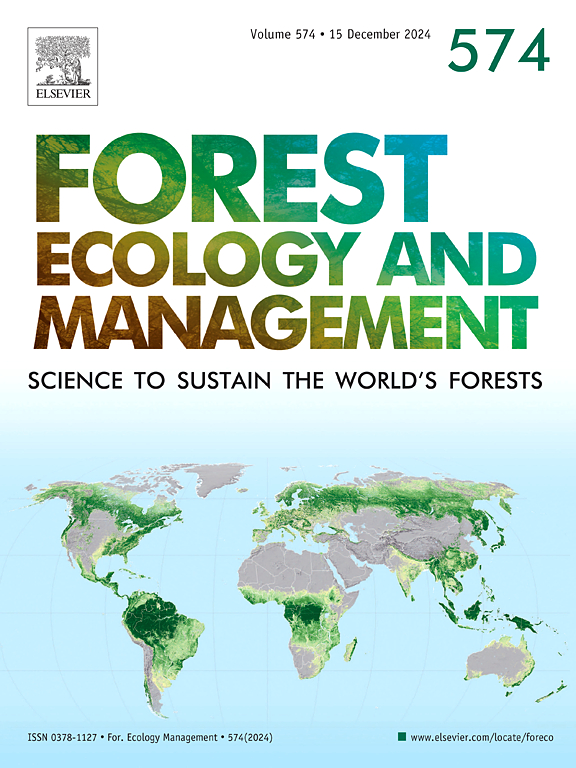Redefining sustainable forestry for a climate emergency
IF 3.7
2区 农林科学
Q1 FORESTRY
引用次数: 0
Abstract
The concept of what constitutes sustainable forestry has evolved over time, as foresters and society have reconsidered our knowledge of forest ecosystems and exactly what should be sustained, where, when, and for whom. Now, as humanity faces a climate emergency, we need a new definition of sustainable forestry that recognizes climate change explicitly, and new approaches to managing forest ecosystems. These new approaches need to be robust: that is, likely to succeed despite enormous uncertainty about the conditions forests will face in the future. Going forward, sustainable forestry must retain recognized values from past conceptions, such as maintaining ecosystem health and biodiversity over the long term, while also addressing the urgent challenge of climate change by increasing carbon stored in both forests and long-lived forest products. We propose the following new definition for sustainable forestry for the 21st century and outline the steps needed to implement it:
Sustainable forestry is forest management that prioritizes mitigating and adapting to climate change during the next several decades as a critical aspect of meeting the social, economic, ecological, and spiritual needs of current and future generations.
Summary of recommendations
- •Adoption by the global forestry community of a new definition of sustainable forestry that recognizes the climate emergency.
- •Implementation of strategies that increase resilience and resistance of forests to climate change effects.
- •At the landscape scale, optimizing for both forest carbon storage and production of wood to substitute for more carbon-intensive materials.
- •Creation of financial systems that make the best climate-smart silvicultural practices profitable.
为应对气候紧急情况重新定义可持续林业
随着林业工作者和社会重新思考我们对森林生态系统的认识,以及什么应该在何时、何地、为谁而维持,构成可持续林业的概念一直在演变。现在,随着人类面临气候紧急情况,我们需要一个明确认识到气候变化的可持续林业的新定义,以及管理森林生态系统的新方法。这些新方法必须稳健:也就是说,尽管森林未来将面临巨大的不确定性,但仍有可能取得成功。展望未来,可持续林业必须从过去的概念中保留公认的价值,例如长期保持生态系统健康和生物多样性,同时通过增加森林和长期森林产品的碳储量来应对气候变化的紧迫挑战。我们提出了21世纪可持续林业的新定义,并概述了实施可持续林业所需的步骤:可持续林业是在未来几十年优先考虑减缓和适应气候变化的森林管理,是满足当代人和子孙后代社会、经济、生态和精神需求的关键方面。•全球林业界通过了认识到气候紧急情况的可持续林业的新定义。•实施提高森林对气候变化影响的复原力和抵抗力的战略。•在景观尺度上,优化森林碳储存和木材生产,以替代更多的碳密集型材料。•建立金融体系,使最佳气候智慧型造林实践有利可图。
本文章由计算机程序翻译,如有差异,请以英文原文为准。
求助全文
约1分钟内获得全文
求助全文
来源期刊

Forest Ecology and Management
农林科学-林学
CiteScore
7.50
自引率
10.80%
发文量
665
审稿时长
39 days
期刊介绍:
Forest Ecology and Management publishes scientific articles linking forest ecology with forest management, focusing on the application of biological, ecological and social knowledge to the management and conservation of plantations and natural forests. The scope of the journal includes all forest ecosystems of the world.
A peer-review process ensures the quality and international interest of the manuscripts accepted for publication. The journal encourages communication between scientists in disparate fields who share a common interest in ecology and forest management, bridging the gap between research workers and forest managers.
We encourage submission of papers that will have the strongest interest and value to the Journal''s international readership. Some key features of papers with strong interest include:
1. Clear connections between the ecology and management of forests;
2. Novel ideas or approaches to important challenges in forest ecology and management;
3. Studies that address a population of interest beyond the scale of single research sites, Three key points in the design of forest experiments, Forest Ecology and Management 255 (2008) 2022-2023);
4. Review Articles on timely, important topics. Authors are welcome to contact one of the editors to discuss the suitability of a potential review manuscript.
The Journal encourages proposals for special issues examining important areas of forest ecology and management. Potential guest editors should contact any of the Editors to begin discussions about topics, potential papers, and other details.
 求助内容:
求助内容: 应助结果提醒方式:
应助结果提醒方式:


